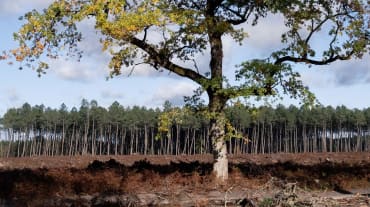Carbon credits: Don’t let big emitters off the hook!
 "Sustainable" air travel with carbon credits from offsetting projects in the rainforest? (© RdR/ Klaus Schenck)
"Sustainable" air travel with carbon credits from offsetting projects in the rainforest? (© RdR/ Klaus Schenck)
Sep 21, 2023
When it comes to climate protection, many companies do not rely on cutting emissions alone: They buy themselves carbon credits from rainforest protection projects – effectively a license to pollute. Yet these certificates rarely benefit the climate or the forests and reduce net emissions much less than claimed. The EU now wants to legitimize such transactions by certifying offsetting measures.
It all sounds so good: “Apple unveils its first carbon-neutral products with the new Watch”, Volkswagen is touting “e-cars that are balance-sheet carbon-neutral”, Shell offers gasoline and diesel with “carbon offsetting programs” and the Lufthansa Group (Austrian, Lufthansa, Swiss) advertises “more sustainable flying”.
Industry and service providers use such promises to entice consumers and create the impression that we can buy their products with a clear conscience, and that our purchases are even helping protect the environment and climate. They do so by buying voluntary carbon credits to offset the carbon footprint of their products on paper, even as they continue to emit CO₂ into the atmosphere – a license to pollute.
Instead of reducing emissions, they offset them and claim to be climate-neutral, while often passing the costs for the certificates on to consumers. At Shell and Lufthansa, customers pay a surcharge for their supposed sustainability.
Booming market with voluntary carbon credits
The trade in voluntary compensation credits is growing rapidly, and more and more certificates are being issued for projects aimed at saving tropical rainforests from the threat of deforestation.
The underlying idea: Intact forests absorb CO₂ from the atmosphere and store it. If a forest is cut down, the carbon escapes back into the air as CO₂. So if you pay to protect forests and thus prevent their destruction, the carbon remains sequestered in the forest and does not contribute to the climate crisis. In the best case, however, this is a zero-sum game.
The technical term for such projects is REDD (Reducing Emissions from Deforestation and Forest Degradation). However, REDD projects have been highly controversial for years for many reasons. After all, how can you seriously calculate how much forest might be cut down in an area in the future, and how much of it can be preserved through conservation projects?
In addition, offsetting projects are often associated with human rights abuses and the eviction of forest communities: They are disenfranchised and driven off their ancestral land because they do not have land titles.
Systematic manipulation and phantom credits
The operators of such projects – certifiers such as Verra and carbon traders – earn millions in the climate business. In early 2023, the Guardian and SourceMaterial shook up the market with the publication of the results of a nine-month investigation into forest offsetting projects. The investigation suggests that greenhouse gas savings claimed with the forest credits are often greatly exaggerated; it describes systematic manipulation and phantom credits.
The US organization Verra is at the center of the criticism: The world’s number one in voluntary climate offsetting dominates three-quarters of the market. Under Verra’s supervision, a total of almost 300 million carbon certificates were sold in 2021. More than a third of these – around 110 million certificates – were related to forest conservation projects.
In no less than 94 percent of the carbon credits for forest compensation projects analyzed, the studies and research showed that the alleged CO₂ savings were overestimated, in some cases many times over. These fictitious credits cause massive damage to the climate – nearly 89 million tons of CO₂ were emitted by the buyers of the credits.
Scientific studies substantiate the allegations
A study published on September 15 by the University of California at Berkeley concludes that the impact of forest protection projects has been greatly exaggerated and some have led to the eviction or dispossession of Indigenous communities.
In August, another research group wrote in the journal Science that most of the projects had not significantly reduced deforestation. According to the editors of Science, the study shows that carbon offsets through paid projects in tropical forests do not reduce deforestation as claimed, exacerbating climate change.
Verra denies the allegations and has issued several statements on the matter.
Planned EU regulations would be a carte blanche for big polluters
Meanwhile, the EU is working on a Carbon Removal Certification Framework (CRCF) that “sets out criteria to define high-quality carbon removals and the process to monitor, report and verify the authenticity of these removals”.
Environmental and climate activists are alarmed. The regulations would be a carte blanche for big polluters because they can continue to burn oil, gas and coal and emit CO₂. Please sign our petition to the EU: Don't let big polluters off the hook. Say no to carbon offsets!.
Our tip: Do not trust the industry’s promises of environmentally friendly and climate-neutral products. Reduce your consumption as much as possible. Buy durable and repairable products, avoid unnecessary trips and air travel.
its first carbon-neutral productsApple 2023. Apple unveils its first carbon-neutral products: https://www.apple.com/newsroom/2023/09/apple-unveils-its-first-carbon-neutral-products/
balance-sheet carbon-neutralVW 2023. Ökobilanz: Wie nachhaltig sind die ID. Modelle? https://www.volkswagen.de/de/elektrofahrzeuge/nachhaltigkeit/oekobilanz-der-id-modelle.html
carbon offsetting programsShell 2023. The carbon offset programme by Shell: https://www.shell.co.uk/shell-go-plus/carbon-emissions-programme.html
more sustainable flyingLufthansa 2023. More sustainable flying: https://www.lufthansa.com/de/en/offset-flight
GuardianThe Guardian 2023. Revealed: more than 90% of rainforest carbon offsets by biggest certifier are worthless, analysis shows:https://www.theguardian.com/environment/2023/jan/18/revealed-forest-carbon-offsets-biggest-provider-worthless-verra-aoe
SourceMaterialSourceMaterial 2023. The Carbon Con: https://www.source-material.org/vercompanies-carbon-offsetting-claims-inflated-methodologies-flawed/
studyHaya et.al. 2023. University of California Berkeley Carbon Trading Project. Quality Assessment of REDD+ Carbon Credit Projects: https://gspp.berkeley.edu/research-and-impact/centers/cepp/projects/berkeley-carbon-trading-project/redd
ScienceWest et al. 2023. Action needed to make carbon offsets from forest conservation work for climate change mitigation: https://www.science.org/doi/10.1126/science.ade3535
ScienceJones et.al. 2023. Forest carbon offsets are failing: https://www.science.org/doi/10.1126/science.adj6951
Verra 2023. Verra Response to Haya et al. Papers: https://verra.org/verra-response-to-forthcoming-haya-et-al-papers/
Verra 2023. Response to New West et al. Study in Science Magazine: https://verra.org/response-to-new-west-et-al-study-in-science-magazine/
Verra 2023. Technical Review of West et al. 2020 and 2023, Guizar-Coutiño 2022, and Coverage in Britain’s Guardian:https://verra.org/technical-review-of-west-et-al-2020-and-2023-guizar-coutino-2022-and-coverage-in-britains-guardian/












